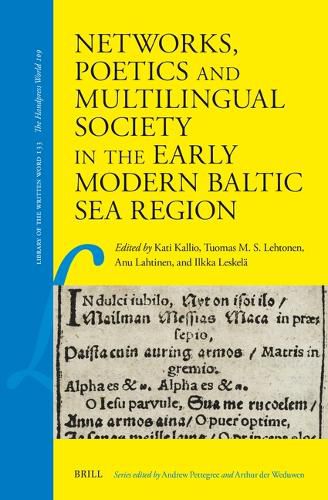Readings Newsletter
Become a Readings Member to make your shopping experience even easier.
Sign in or sign up for free!
You’re not far away from qualifying for FREE standard shipping within Australia
You’ve qualified for FREE standard shipping within Australia
The cart is loading…






The literarisation of the early modern Baltic Sea region was a long and complex process with varying trajectories for different vernacular languages. This volume highlights the interaction of local social and cultural settings with wider political and confessional contexts. Using rarely examined materials, such as prints, court protocols, letters and manuscripts in Latin and a range of vernacular languages, including Estonian, Finnish, German, Ingrian, Karelian, Latvian, Lenape, Sami languages and Swedish, the thirteen authors chart the social and literary developments of the area. Wide networks of learned men and officials but also the number of native speakers in the clergy defined the ways the poetic resources of transnational and local literary and oral cultures benefited the nascent literatures.
Contributors include: Eeva-Liisa Bastman, Kati Kallio, Suvi-Paeivi Koski, Ulla Koskinen, Miia Kuha, Anu Lahtinen, Tuija Laine, Tuomas M. S. Lehtonen, Ilkka Leskelae, Aivar Poldvee, Sanna Raninen, Kristiina Ross, Taarna Valtonen, and Kristi Viiding.
$9.00 standard shipping within Australia
FREE standard shipping within Australia for orders over $100.00
Express & International shipping calculated at checkout
The literarisation of the early modern Baltic Sea region was a long and complex process with varying trajectories for different vernacular languages. This volume highlights the interaction of local social and cultural settings with wider political and confessional contexts. Using rarely examined materials, such as prints, court protocols, letters and manuscripts in Latin and a range of vernacular languages, including Estonian, Finnish, German, Ingrian, Karelian, Latvian, Lenape, Sami languages and Swedish, the thirteen authors chart the social and literary developments of the area. Wide networks of learned men and officials but also the number of native speakers in the clergy defined the ways the poetic resources of transnational and local literary and oral cultures benefited the nascent literatures.
Contributors include: Eeva-Liisa Bastman, Kati Kallio, Suvi-Paeivi Koski, Ulla Koskinen, Miia Kuha, Anu Lahtinen, Tuija Laine, Tuomas M. S. Lehtonen, Ilkka Leskelae, Aivar Poldvee, Sanna Raninen, Kristiina Ross, Taarna Valtonen, and Kristi Viiding.